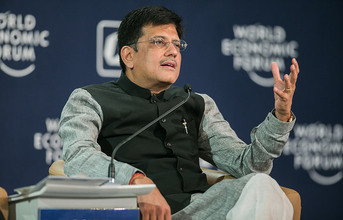
According to Piyush Goyal, Minister of State for Power, Coal and Renewable Energy the Government is working towards making India a power-surplus country by 2019.
He stated that ensuring the availability of power on a 24 x 7 basis is one of the most pressing challenges that the government is facing today. The Minister was addressing a session on ‘Lighting India' at the India Economic Summit being organised by the World Economic Forum and the Confederation of Indian Industry in New Delhi.
The Minister pointed out that 53 million homes in the country were not yet electrified. There were still many offices and factories operating on diesel gensets. The government had made it a priority to find ways of ensuring that power reaches these consumers. He expected that the demand for power in the country would double in the next 5 years.
To solve these issues the government was pursuing a two-pronged strategy of improving the utilisation of existing assets by improving plant load factor and freeing up stranded assets and improving access to fuel supplies. The government was also improving the electricity mix with greater focus on renewable energy sources.
The Minister highlighted that the government was sorting out the coal issue by passing an ordinance taking into account the judgement passed by the Supreme Court of India and he was hopeful that private sector participation in the coal sector would once again pick up. In addition, measures were being taken to double the output of coal from Coal India over the next five years. This will help enhance the utilization of existing thermal power plants.
He stated that renewable sources of energy are one of the thrust areas of the government. The government was taking measures to ensure that solar power generation would touch 100 GW by 2019. The Minister stated that efforts were on to improve the bankability of projects in the power sector. The Minister stated that the government was planning to invest US$ 250 billion in the power sector over the next five years.
Addressing the Summit, TP Chopra, President and Chief Executive Officer, Bharat Light and Power stated that as India's population continued to grow, so did the demand for power. This was being further fuelled by the trend of urbanisation and the growth of mega-cities in India. Accessibility, affordability and availability of power, were therefore the key issues facing the country. He highlighted the need to effectively utilize technology to improve the efficiency of the power generating system in India. He felt that the cost of generating renewable energy such as solar power was declining and that would make it a viable alternative source of energy.
In his address, Ashvin Dayal, Associate Vice President and Managing Director, Asia, Rockefeller Foundation stated that power was a catalyst that could bring about a real revolution in the rural areas. It is for this reason that the Rockefeller Foundation was promoting the creation of 1000 mini-grids in rural areas. He was of the view that there is a need to focus on off-grid solutions in the near term to electrify villages which are not on the grid. He also highlighted the need to reduce the cost of capital in India especially for small projects.
Dong-Kwan Kim, Managing Director, Hanwha Group stressed on the need to move away from power plants using fossil fuels and to adopt renewable sources of energy. This, in his view would help mitigate the effects of climate change - which was turning into a health issue for everyone. He was of the view that in order to achieve this, there needed to be a stable policy environment which would foster the development of these renewable sources of energy.
